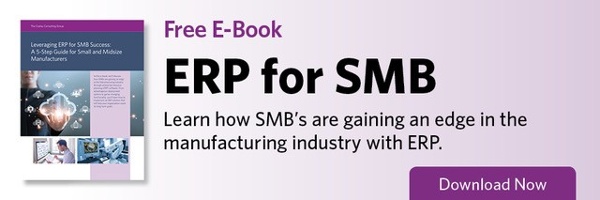In this special blog series, ERP for Small and Midsize Manufacturers, we’ll discuss how SMBs are gaining an edge in the Manufacturing industry through ERP software. From flexible deployment options to mission-critical functionality, you’ll learn what to look for to extend the value and shelf life of your next ERP system.
Small and midsize businesses (SMBs) in the manufacturing industry are used to having to do more with less. When you’re up against larger companies that have more capital and more manpower, resourcefulness can be the key to thriving in a competitive marketplace.
This same principle applies when looking to adopt an ERP system. Of course, you’ll need a software that provides the functionality needed to support your business. But you’ll also need to consider your business’s ability to support this new system. Do you have the infrastructure, bandwidth and budget to manage the data storage, security and networking needs of a complex software system?

Whether you’re ready to build out your server room or would rather focus your energies on your core business, cloud-based ERP systems offer the flexibility to help you optimize your resources and create a solution that’s right for your organization.
What is Cloud ERP?
With a cloud-based ERP system, your software runs on a shared computing resource, and your users access the system via the internet. This shared resource, or “cloud,” can be hosted on-premise at your company or off-site by a service provider.
There are many reasons for an SMB to consider a cloud-based ERP system. Perhaps at the top of the list is workforce mobility. The ability to access the system via the web supports your employees’ capacity to do business anytime, anywhere - when they are away from their desks, at a secondary facility or on a client visit. And it allows workers from all departments to tap into the same system, ensuring the up-to-date information and streamlined communications that allow your operations to become more efficient and your organization to remain competitive.
Three Flexible Ways to Adopt
The draw of cloud-based ERP is rooted in its flexibility. Here are three ways you might choose to adopt the cloud.
1. SaaS
In the software as a service (SaaS) model, your cloud ERP system is hosted and managed by a service provider, allowing your users to access the system via the internet simultaneously. Under this arrangement, an SMB does not need to audit and potentially build out its infrastructure because all equipment is located in an off-site data center managed by the service provider. All that’s required is a paid subscription and an internet connection for your organization to gain access to your data and application. For smaller businesses, a SaaS-based cloud ERP system can be desirable due to its minimized commitment – and often minimized costs.
2. Private Cloud
For SMBs that have invested or plan to invest in a strong IT infrastructure, a cloud-based ERP system can be run on a private network. In this arrangement, virtualized resources are privately purchased and used solely by your organization. These resources are then managed by your in-house technical staff. Using a private cloud-based system allows SMBs to maintain stronger control of their data by managing it through their own resources.
This approach might also be preferred by businesses with stricter regulatory requirements. As an example, a medical device manufacturer needs to comply with FDA regulations requiring a single tenant cloud infrastructure. This means that the company’s data needs to be housed on a single server, which is not shared with anyone else. In that case, a private cloud, hosted by either the company or an outside service provider, would make the most sense.
3. Blended Approach
For those who would like to control a portion of their data or make use of their existing infrastructure without overloading it, a blended approach allows organizations to leverage both private and public cloud resources. The benefit of this arrangement is that SMBs can tackle a segment of their management and storage needs behind their own firewall while getting back-up capacity from a service provider as needed (e.g., when the organization experiences growth).
Conclusion
Hosting an ERP system on the cloud gives SMBs the flexibility to do what they do best: make the most of their resources to maintain an edge in the game. Whether you are an IT powerhouse ready to launch ERP on your private cloud, a niche manufacturer looking to enhance workforce mobility with a SaaS provider or fall somewhere in between, cloud-based ERP is ready to meet you where you are – and help you stay nimble in the years ahead.

